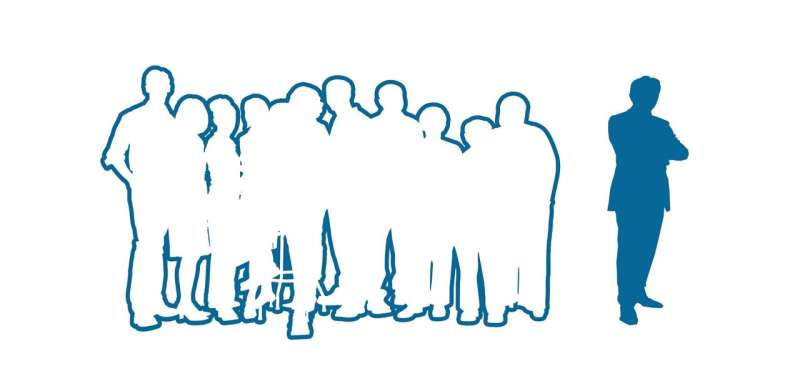Social rejection could drive people to take COVID-19 safety precautions, new research finds

Interpersonal rejection can motivate people who do not normally worry about disease to protect themselves against COVID-19. The experience of feeling interpersonally hurt or rejected, known as social pain, makes people more likely to feel that they need to protect themselves from others, according to new research in Social Psychological and Personality Science.
This research examines how people protect themselves against disease threats as well as from being hurt by others. Prior research suggests that people may be less likely to take safety precautions when they are more worried about their connection to others, but that might not always be the case.
"Concerns about the social connection and concerns about disease can reinforce one another," says lead author Dr. Sandra Murray of the University at Buffalo. "When you're really concerned about social connection, it can make you take the disease threat that others pose to you more seriously."
Researchers analyzed four daily diary samples involving 2,794 participants from the United States and United Kingdom who reported how hurt or rejected they felt by those they knew, how personally concerned they were about the spread of COVID-19, and how vigilantly they took precautions to safeguard against disease.
The authors found that people who believed they were invulnerable to infectious disease engaged in more concerted efforts to protect themselves against COVID-19 when they were in social pain.
"When social interactions are more painful, it is a warning that motivates people who don't normally worry about diseases to take greater steps to protect themselves against COVID-19," says Dr. Murray.
Likewise, researchers note that when social interactions are less painful, people who are less concerned about catching infectious diseases may be less likely to protect themselves. This can lull them into overlooking the threat that COVID-19 poses.
Dr. Murray emphasizes that the researchers are not urging people to reject others in an effort to motivate them to take actions to protect themselves against COVID-19, nor that social connections are the only factor in the fight against the disease. However, the study suggests that normal social interactions can change the way people respond to the daily threat of COVID-19.
Future research, Dr. Murray notes, should examine how daily experiences with social pain can affect other types of health behaviors, such as preventative vaccinations.
"The current research is only one piece of the puzzle," says Dr. Murray, "but it does suggest that it's important to understand how people's behavior is influenced by the non-physical threats that other pose to them."
More information: Sandra L. Murray et al, Sensitizing the Behavioral-Immune System: The Power of Social Pain, Social Psychological and Personality Science (2022). DOI: 10.1177/19485506221107741



















